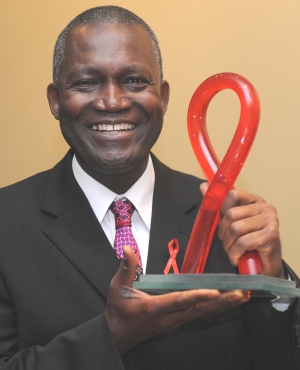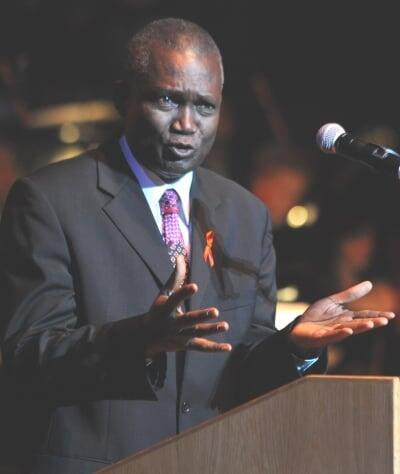The world has seen a 50 per cent reduction in the rate of new HIV infections in 25 low- and middle-income countries, UNFPA’s sister organization UNAIDS (the Joint United Nations Programme on HIV/AIDS) reported in November. This was remarkable, even more so because more than half of the countries showing such good progress are in Africa, the region most affected by HIV, said UNFPA Africa Regional Director, Mr. Bunmi Makinwa.
Speaking at a World AIDS Day Gala Concert held by the University of Stellenbosch, Mr. Makinwa said that in South Africa the rate of new HIV infections had been cut by 41 per cent since 2001, and more than 1.7 million people now had access to lifesaving treatment. “I am especially pleased to tell you that globally, far fewer babies are being born with HIV. That’s a very hopeful sign.”
The event was hosted by the University’s Africa Centre for HIV and AIDS Management. At the event, Mr. Makinwa received an award in recognition of UNFPA’s contribution to the prevention of HIV in Africa.
He said, however, that the total number of new HIV infections worldwide remained high, at 2.5 million in 2011. Compounding the matter is the poor treatment of people living with HIV (PLWHIV) in the workplace and elsewhere. “They are often sidelined and not assisted to stay healthy and remain productive members of society. That is why the work of Stellenbosch University’s Africa Centre for HIV and AIDS Management is so important. It provides hope to everyone affected by the disease, which is all of us, really – whether we have HIV or not. And that is why UNFPA supports the Africa Centre.”
The Letter of Understanding that UNFPA signed with Stellenbosch University in July this year, and which was unprecedented in the UN system, allows the organization to tap into some of the best expertise in the world for the work that the Population Fund does on the African continent.

“The Africa Centre is now our partner in collaborating for the best service and outputs for development work in 46 countries on our continent. This agreement is aimed at boosting one of the most ambitious global programmes ever – the Millennium Development Goals.” These were adopted by world leaders at the turn of the century with the twin aims of reducing poverty and promoting development.
“Two years away from the target date of 2015, some regions are doing better than others,” Mr. Makinwa said. “In Africa – particularly sub-Saharan Africa – there is good progress in some areas. But many countries are unfortunately lagging on some of the indicators. Clearly we need to redouble our efforts, and that’s where this agreement comes in. UNFPA, through our Regional Programme for Africa, is well placed to promote the MDGs on our continent.”
In particular, this is the case with the goals relating to HIV and AIDS, gender equality, and maternal and child health. “Africa has the highest maternal mortality rate in the world – on average, more than 500 per 100,000 live births,” he said. “Compare this to the figure of 50-70 per 100,000 in other regions, such as Asia, and you get some idea of the scale of the challenge.”



